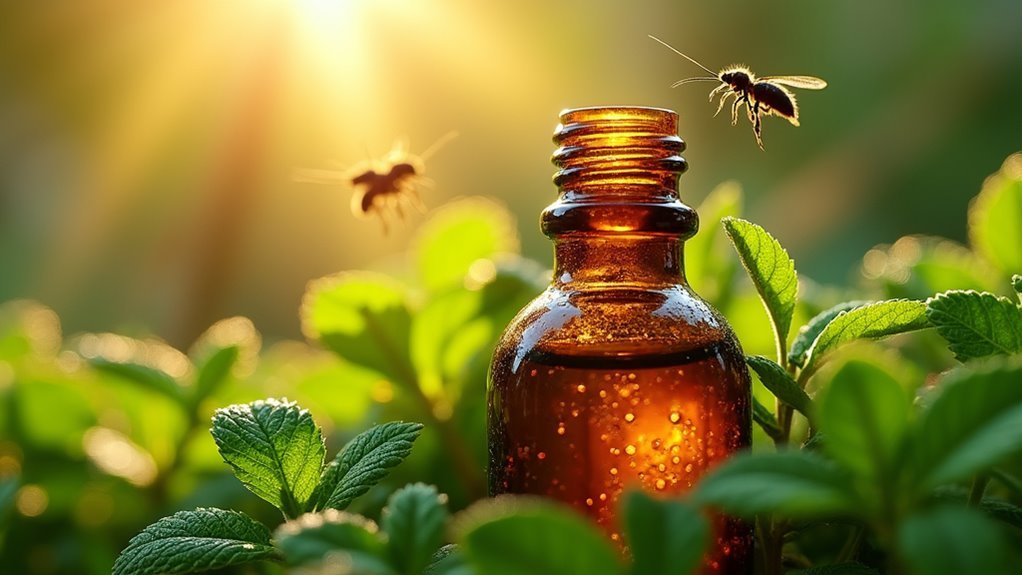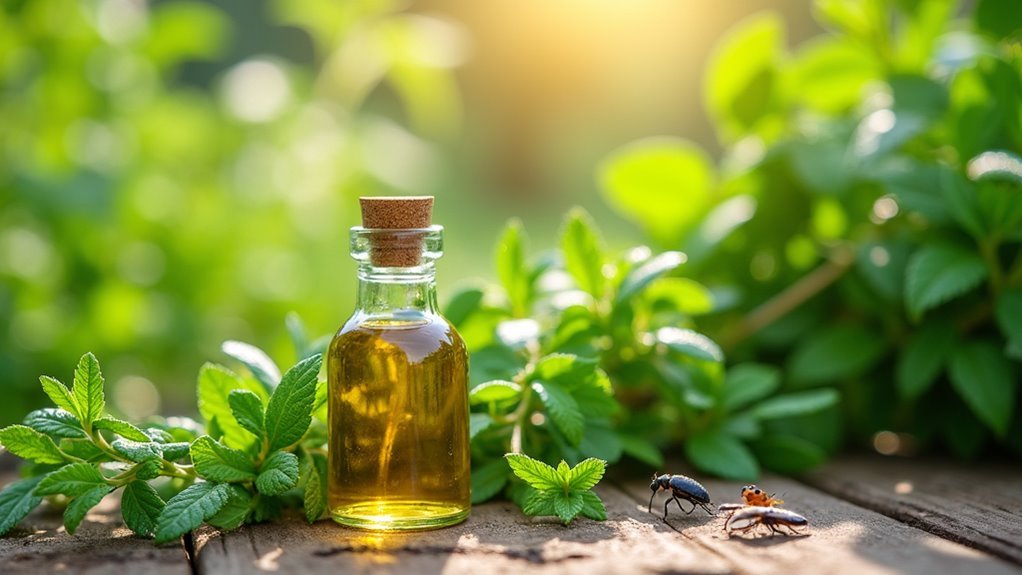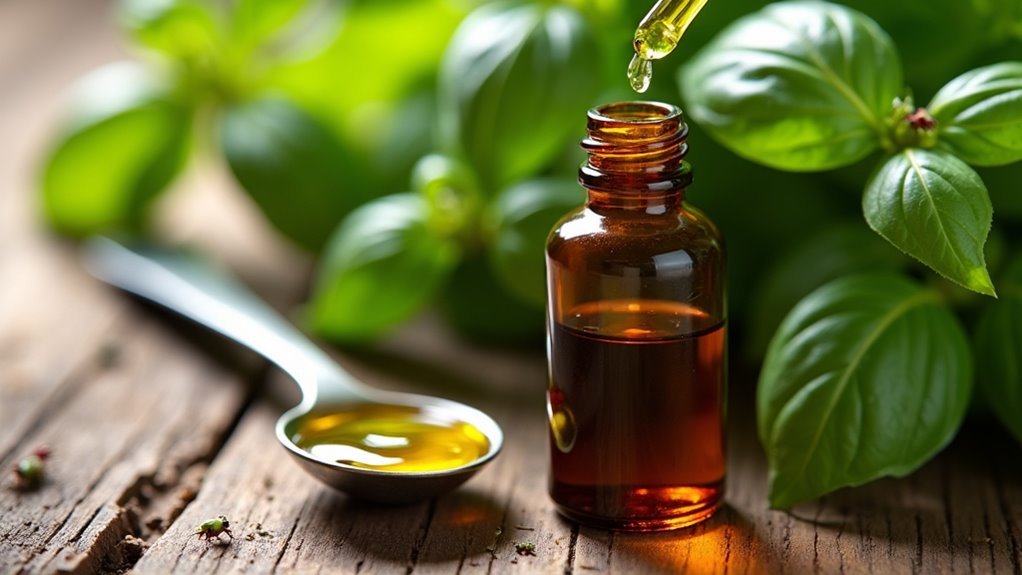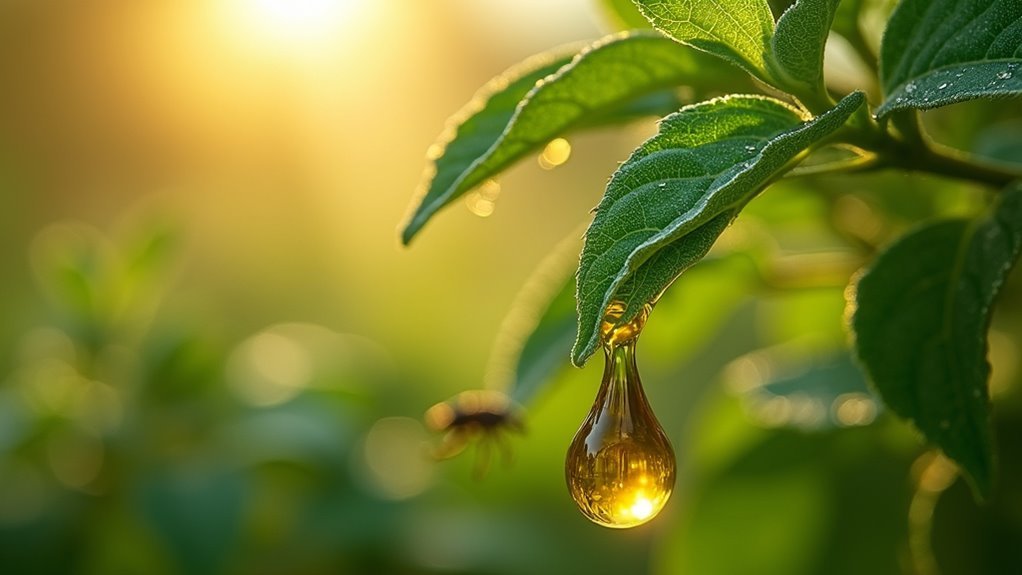You can protect your garden naturally using oregano oil’s powerful compounds carvacrol and thymol, which create an invisible barrier that repels aphids, spider mites, mosquitoes, and ticks while combating fungal diseases like powdery mildew. Mix 10 drops of oregano essential oil with 2 cups of water and 5 drops of dish soap for an effective spray that won’t harm beneficial insects like ladybugs. This natural solution strengthens your plants’ defenses and reduces reliance on harsh chemicals, offering extensive insights into advanced application techniques.
Understanding Oregano Oil’s Pest-Fighting Compounds

The natural compounds in oregano oil make it a powerful weapon against garden pests. When you apply oregano oil to your garden, you’re harnessing carvacrol and thymol, two potent compounds that pack serious antibacterial and antifungal punch.
These active ingredients don’t just repel pests—they actively combat harmful microorganisms that threaten your plants’ health.
You’ll find that oregano oil’s strong scent creates an invisible shield around your plants, naturally deterring insects like ticks and mosquitoes from establishing infestations.
The oil’s antioxidant properties work double duty, strengthening your plants’ natural defenses against environmental stress while inhibiting bacterial growth in the soil.
This protective barrier doesn’t just keep pests away—it enhances your plants’ overall resilience and ability to thrive in challenging conditions.
Natural Antibacterial and Antifungal Properties for Garden Protection
Garden diseases don’t stand a chance against oregano oil’s powerful antimicrobial arsenal.
You’ll find that carvacrol and thymol, oregano oil’s active compounds, deliver exceptional antibacterial and antifungal protection for your plants. These potent molecules effectively eliminate harmful pathogens like Staphylococcus aureus and Candida that threaten your garden’s health.
When you dilute oregano oil into a natural spray, you’re creating a protective barrier against bacterial infections that can devastate crops. The antifungal properties specifically target common garden diseases including powdery mildew and root rot, preventing their spread throughout your plants.
You’ll notice improved plant resilience and overall health when applying oregano oil regularly.
Beyond controlling harmful microorganisms, oregano oil enhances companion planting effectiveness, creating a synergistic environment that promotes robust plant growth and increased productivity in your garden.
Target Pests Oregano Oil Effectively Repels

You’ll find oregano oil works exceptionally well against aphids, spider mites, mosquitoes, and ticks that commonly plague garden spaces.
The oil’s active compounds carvacrol and thymol create a natural barrier that these pests can’t tolerate, forcing them to seek other areas.
Research shows you can achieve significant reductions in pest populations by applying properly diluted oregano oil directly to your plants.
Common Garden Pests
While chemical pesticides can harm beneficial insects and contaminate soil, oregano oil offers a targeted approach that specifically repels some of your garden’s most persistent invaders.
You’ll find oregano oil particularly effective against three major pest categories that commonly plague home gardens:
- Aphids – These soft-bodied insects cluster on new growth and stems, sucking plant juices and weakening your crops.
- Spider mites – Microscopic pests that create fine webbing while feeding on leaf undersides, causing yellowing and stippling damage.
- Whiteflies – Small flying insects that gather on leaf undersides, transmitting diseases while feeding on plant sap.
The carvacrol and thymol compounds in oregano oil disrupt these pests’ life cycles and feeding patterns.
Unlike broad-spectrum chemicals, this natural solution targets harmful insects while preserving beneficial predators like ladybugs and lacewings.
Effectiveness Against Insects
Several scientific studies confirm oregano oil’s remarkable effectiveness against specific garden insects, with carvacrol concentrations as low as 0.1% proving lethal to aphid populations within 24 hours.
You’ll find oregano oil particularly effective against spider mites, thrips, and whiteflies, disrupting their reproductive cycles and preventing maturation. The compound’s strong aromatic profile creates an inhospitable environment that forces pests to relocate elsewhere in your garden.
When you’re dealing with mosquitoes and ticks, oregano oil’s scent acts as a powerful natural deterrent. Unlike sage essential oil, oregano oil’s carvacrol content provides broader spectrum protection against both flying and crawling insects.
You can expect significant population reductions within days of application, as the oil interferes with insects’ nervous systems while simultaneously protecting your plants from pest-related fungal diseases.
Creating Your Own Oregano Oil Garden Spray
You can easily make an effective oregano oil garden spray using just a few simple ingredients from your kitchen.
Mix 10 drops of oregano essential oil with 2 cups of water and 5 drops of dish soap to create a powerful pest-repelling solution.
Apply your homemade spray during early morning or late evening hours to maximize effectiveness while protecting beneficial insects.
Essential Oil Recipe Ingredients
Creating an effective oregano oil garden spray requires just a few simple ingredients that you likely already have at home. This natural pest deterrent combines the power of essential oils with common household items to protect your plants without harsh chemicals.
Your oregano oil spray recipe needs:
- 10 drops of oregano essential oil – the active ingredient that repels pests naturally
- 2 cups of water – serves as the base solution for diluting the concentrated oils
- 5 drops of dish soap – helps emulsify and bind the oils while improving surface adhesion
The dish soap component is essential because it allows the essential oils to mix properly with water rather than separating. Choose gentle options like Castile or Thieves soap for best results. This simple combination creates a potent, eco-friendly solution.
Application Timing Guidelines
| Time Period | Temperature | Sun Intensity | Application Result | Recommended |
|---|---|---|---|---|
| Early Morning (6-8 AM) | Cool | Low | Ideal absorption | Yes |
| Midday (10 AM-4 PM) | Hot | High | Leaf burn risk | No |
| Late Evening (6+ PM) | Cool | Low | Safe application | Yes |
| Night (8+ PM) | Cool | None | Good penetration | Yes |
| Rainy Weather | Variable | Low | Poor effectiveness | No |
Following these application timing guidelines guarantees maximum pest control effectiveness while protecting your plants from potential damage.
Proper Dilution Ratios for Safe Plant Application

While oregano oil offers powerful pest control benefits, proper dilution is essential to prevent plant damage and guarantee safe application.
You’ll need to follow specific proper dilution ratios to harness oregano oil’s pest-fighting power without causing phytotoxicity.
For direct plant treatment, mix 1-2 drops of oregano oil with a teaspoon of carrier oil. This concentrated approach works well for targeted applications on affected areas.
- Spray applications: Combine 10-15 drops of oregano oil with 2 cups of water for effective pest control coverage.
- Patch testing: Always test diluted solution on a small plant area first, waiting 24 hours to check for adverse reactions.
- Reapplication schedule: Apply every 7-10 days or after rain to maintain pest management effectiveness.
Ensure thorough mixing before each use for consistent results.
Best Application Methods and Timing
Strategic timing and application methods can make the difference between successful pest control and plant damage when using oregano oil in your garden.
Apply your diluted oregano oil spray during early morning or late evening hours to prevent leaf burn and maximize absorption. These cooler periods protect your plants while ensuring the oil penetrates effectively.
Test your oregano oil solution on a small plant area first to check for adverse reactions before widespread application.
Reapply every 7-10 days or immediately after rainfall to maintain pest-repelling effectiveness.
For enhanced results, combine oregano oil with complementary essential oils like peppermint or lavender, creating a synergistic effect that targets multiple pest species while providing thorough garden protection.
Combining Oregano Oil With Other Essential Oils
Because oregano oil’s active compounds like carvacrol and thymol work synergistically with other essential oils, you’ll achieve more thorough pest control by creating targeted blends rather than relying on a single oil.
Using essential oils strategically enhances your garden’s defense system. Here are proven combinations that maximize oregano oil’s effectiveness:
- Oregano + Peppermint + Lavender: Creates a powerful natural deterrent that repels various garden pests while providing antimicrobial protection.
- Oregano + Cedarwood: Specifically targets mosquitoes and ticks with enhanced repelling properties from cedarwood’s natural compounds.
- Oregano + Clove + Orange: Deters disease-carrying insects while adding pleasant citrus fragrance to your garden space.
Remember to properly dilute your essential oil blends in water with dish soap for ideal adherence to plant surfaces and maximum pest-repelling effects.
Protecting Beneficial Insects While Controlling Pests
When you apply oregano oil thoughtfully, you’ll protect your garden’s beneficial insects while eliminating harmful pests. The key lies in moderation and proper application techniques.
Carvacrol, oregano oil’s active compound, targets destructive aphids and spider mites without harming valuable allies like ladybugs and lacewings.
You’re creating a balanced ecosystem when you use these natural oils correctly. Unlike harsh chemical pesticides that devastate beneficial populations, oregano oil maintains selective action.
This approach supports your garden’s natural resilience while reducing chemical dependency. Your targeted application protects essential pollinators and predatory insects that keep pest populations in check.
Oregano Oil for Disease Prevention in Plants
You’ll find oregano oil’s antimicrobial compounds like carvacrol and thymol don’t just repel pests—they’re powerful weapons against plant diseases too.
When you apply diluted oregano oil regularly, you’re actively preventing fungal infections like root rot and protecting your plants from harmful bacterial pathogens.
This natural treatment strengthens your plants’ immune systems, making them more resilient against the diseases that typically devastate garden crops.
Fungal Infection Combat
Fungal diseases can devastate your garden, turning healthy plants into wilted, diseased specimens that struggle to survive. Oregano oil’s high thymol content offers a powerful natural solution for combating these destructive infections.
Unlike chemical alternatives, this essential oil targets harmful fungi while preserving beneficial insects and maintaining environmental safety.
When you dilute oregano oil and apply it as a foliar spray, you’re creating an effective barrier against common fungal threats:
- Botrytis and Fusarium control – Natural antifungal properties specifically target these destructive plant diseases
- Bacterial inhibition – Antibacterial compounds prevent secondary infections that often follow fungal damage
- Enhanced plant resilience – Regular applications strengthen your plants’ natural defenses against future infections
This dual-action approach not only eliminates existing fungal problems but also prevents future outbreaks, reducing your reliance on synthetic fungicides while protecting against various garden pests.
Bacterial Disease Prevention
Although fungal infections often steal the spotlight in garden disease discussions, bacterial pathogens pose an equally serious threat to your plants’ health and productivity. Oregano oil’s high carvacrol and thymol content makes it exceptionally effective for bacterial disease prevention in your garden.
| Bacterial Pathogen | Plant Impact | Oregano Oil Effect |
|---|---|---|
| Staphylococcus aureus | Leaf spots, wilting | Growth inhibition |
| Pseudomonas syringae | Bacterial blight | Protective barrier |
| Erwinia carotovora | Soft rot disease | Antibacterial action |
| Xanthomonas campestris | Vascular damage | Surface protection |
| Ralstonia solanacearum | Root system failure | Penetration prevention |
When you apply oregano oil as a foliar spray, it creates a protective barrier that prevents bacterial infections from establishing. This holistic approach enhances plant resilience while reducing chemical intervention needs.
Plant Immunity Boost
When oregano oil penetrates plant tissues, it triggers a cascade of defensive responses that strengthen your garden’s natural immunity against pathogens.
This natural plant immunity boost helps your crops develop stronger resistance mechanisms against bacterial and fungal threats.
Regular oregano oil applications enhance your plants’ ability to recognize and respond to potential infections before they establish.
The oil’s active compounds work synergistically with your plants’ existing defense systems, creating a more robust protective barrier.
- Enhanced cellular defense: Carvacrol and thymol stimulate protein production that fortifies cell walls against pathogen invasion
- Improved stress tolerance: Strengthened plants better withstand environmental pressures that typically weaken immune responses
- Faster recovery rates: Boosted immunity helps plants heal quickly from minor damage or early-stage infections
This proactive approach guarantees healthier, more resilient gardens.
Storage and Shelf Life of Homemade Oregano Sprays
Once you’ve prepared your homemade oregano spray, proper storage becomes crucial for maintaining its pest-fighting effectiveness.
Store your spray in a cool, dark place to preserve the essential oils’ potency. The shelf life typically ranges from one to two weeks before efficacy begins diminishing due to volatile oil breakdown.
Use dark glass spray bottles for storage since they protect essential oils from light degradation that reduces quality.
You can extend your spray’s lifespan by adding natural preservatives like vitamin E oil, which helps stabilize the mixture.
Always shake well before each application. Essential oils naturally separate over time, so proper mixing guarantees even ingredient distribution and consistent pest control results throughout your spray’s usable period.
Monitoring Results and Adjusting Treatment Frequency
After applying your oregano spray, you’ll need to track its performance against garden pests to optimize your treatment schedule. Monitoring results requires consistent observation of your plants for signs like chewed leaves, visible insects, or pest damage patterns.
Your treatment frequency should adapt based on what you observe:
- Document everything – Keep a detailed garden journal recording pest activity levels, plant health changes, and weather conditions after each oregano oil application.
- Adjust application timing – Increase frequency during peak infestations or when environmental factors like high humidity create favorable pest conditions.
- Modify concentration – If pests persist despite regular treatments, evaluate whether you need a stronger oregano oil mixture to enhance effectiveness.
This systematic approach guarantees you’re using oregano oil efficiently while maintaining effective pest control.
Frequently Asked Questions
What Bugs Does Oregano Oil Repel?
You’ll find oregano oil effectively repels aphids, spider mites, and whiteflies from your garden. Its active compounds, carvacrol and thymol, create an unfavorable environment that disrupts these pests’ behavior and reproductive capabilities naturally.
Does Oregano Repel Garden Pests?
You’ll find oregano effectively repels garden pests through its strong scent and natural compounds. It deters insects like aphids, spider mites, and ants while supporting plant health without harming beneficial garden insects.
What Does Oregano Fight Against?
You’ll find oregano fights ants, mosquitoes, ticks, mold, mildew, and harmful bacteria. It’s effective against fungal infections and various garden pathogens while reducing oxidative stress that weakens your plants’ natural defenses.
How to Use Oregano as Insect Repellent?
You’ll mix 10 drops of oregano essential oil with 2 cups of water and dish soap. Test on small plant areas first, then spray during early morning or evening to avoid leaf burning.
In Summary
You’ve discovered oregano oil’s remarkable potential as a natural pest deterrent that protects your plants without harming beneficial insects. Start with proper dilution ratios, monitor your garden’s response, and adjust application frequency as needed. Store your homemade sprays correctly to maintain their effectiveness. With consistent use, you’ll create a healthier garden ecosystem while reducing your reliance on synthetic pesticides. Your plants will thrive under this powerful, natural protection system.





Leave a Reply